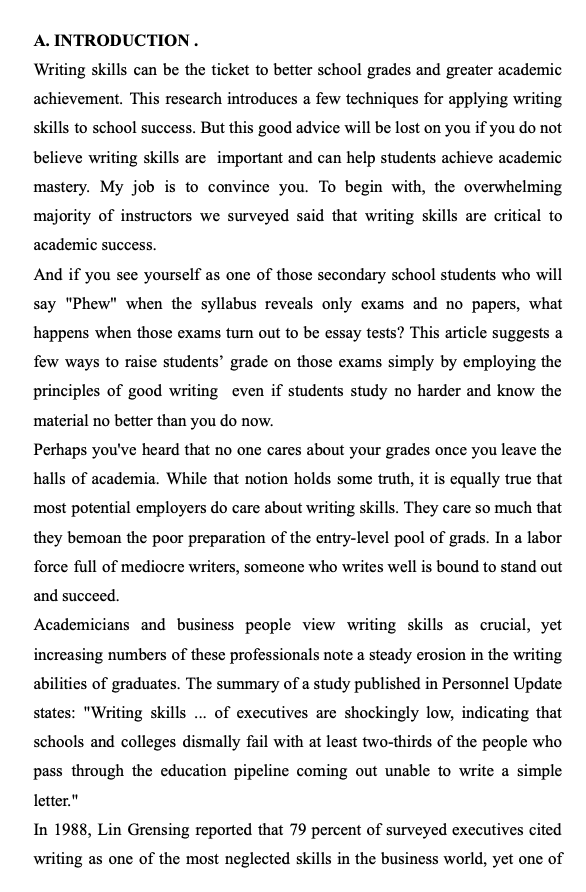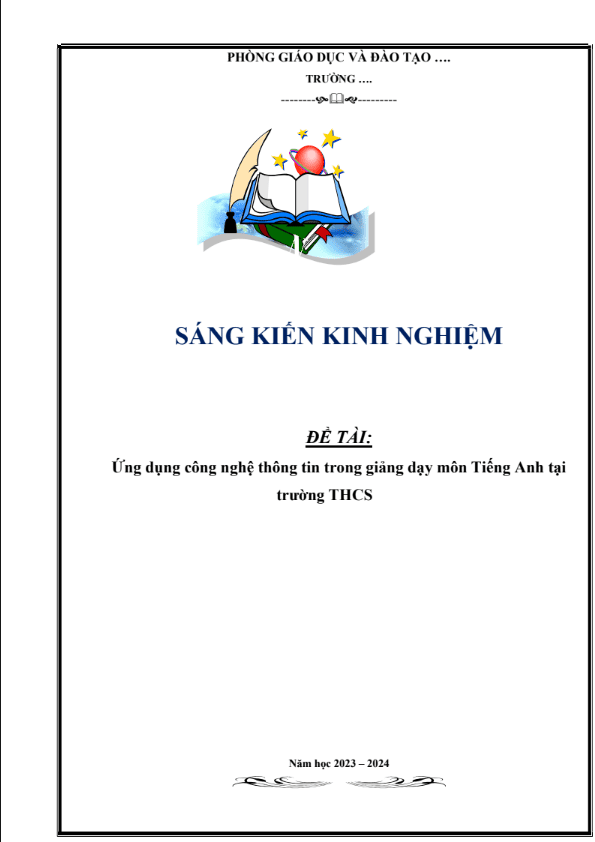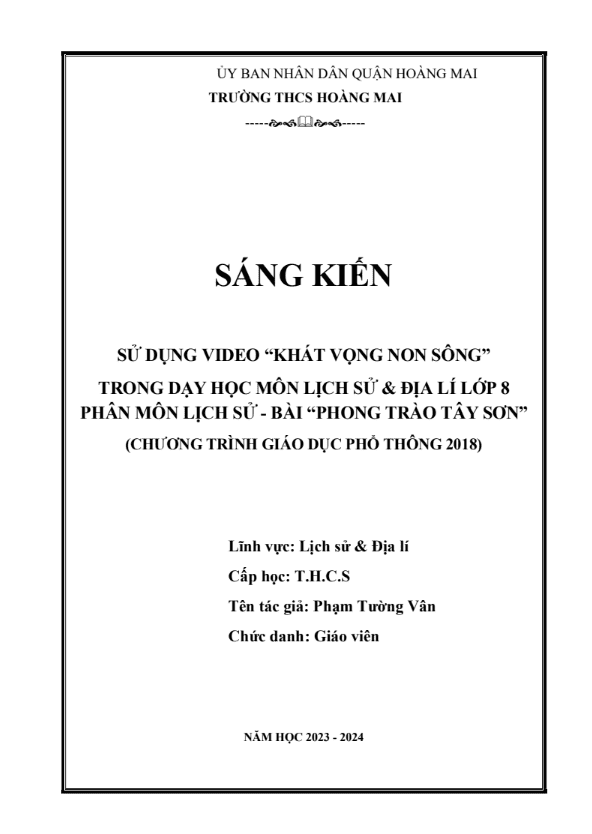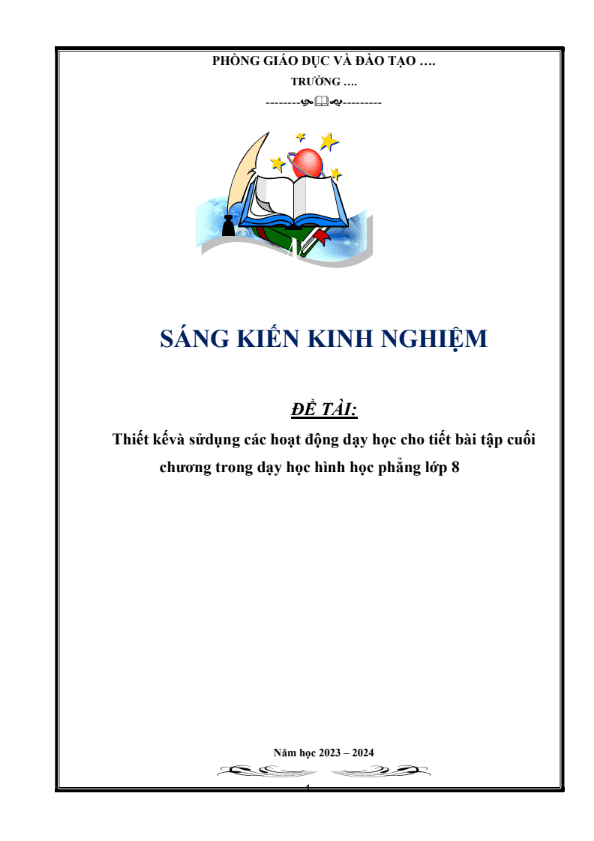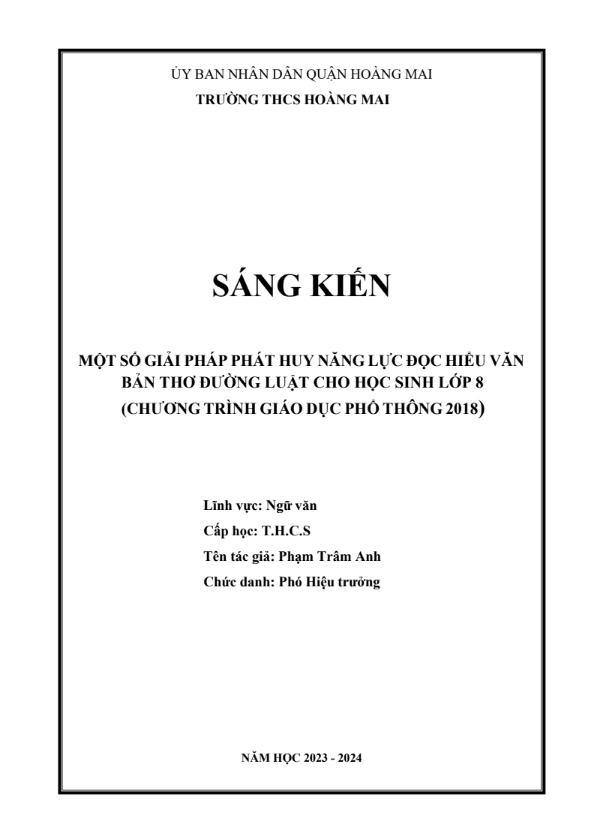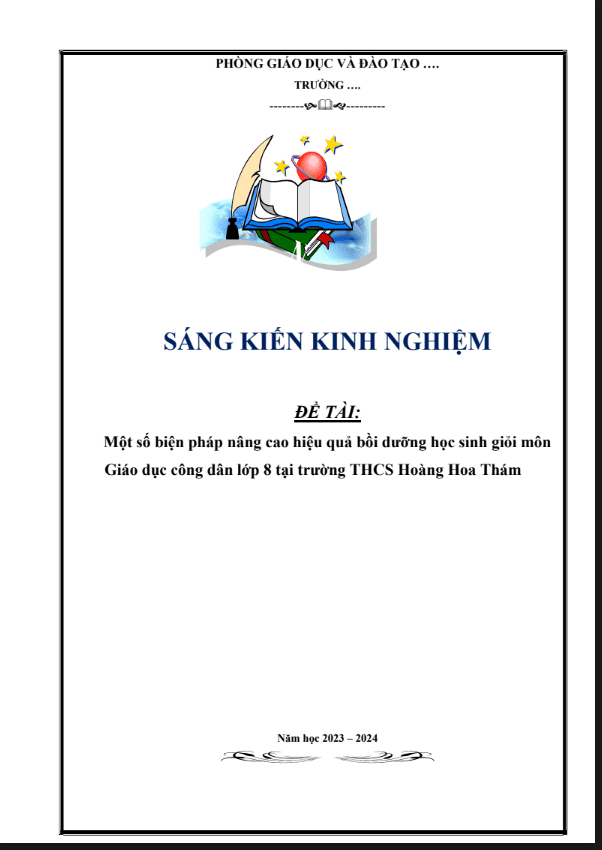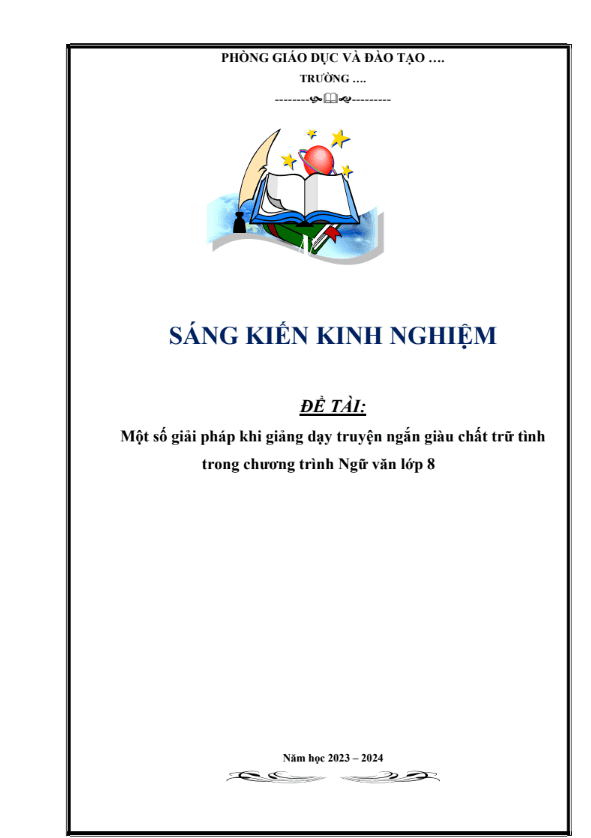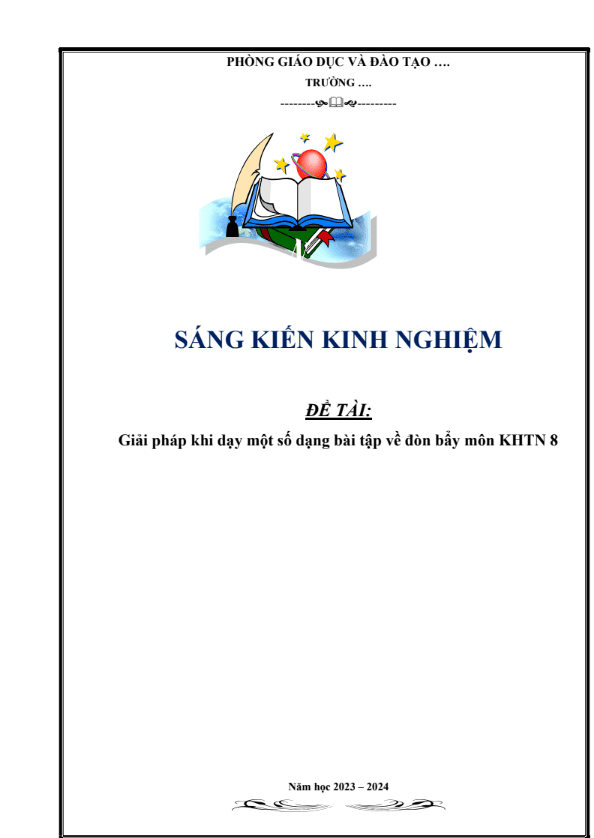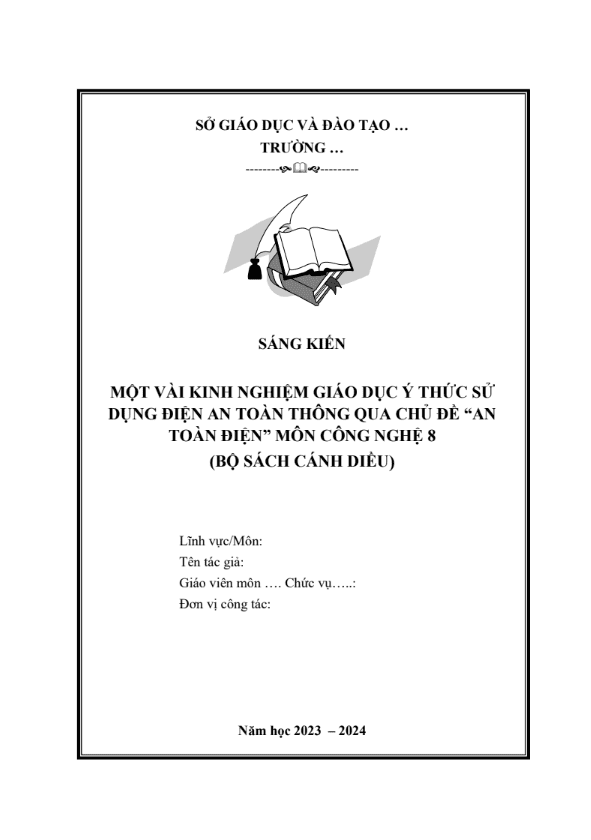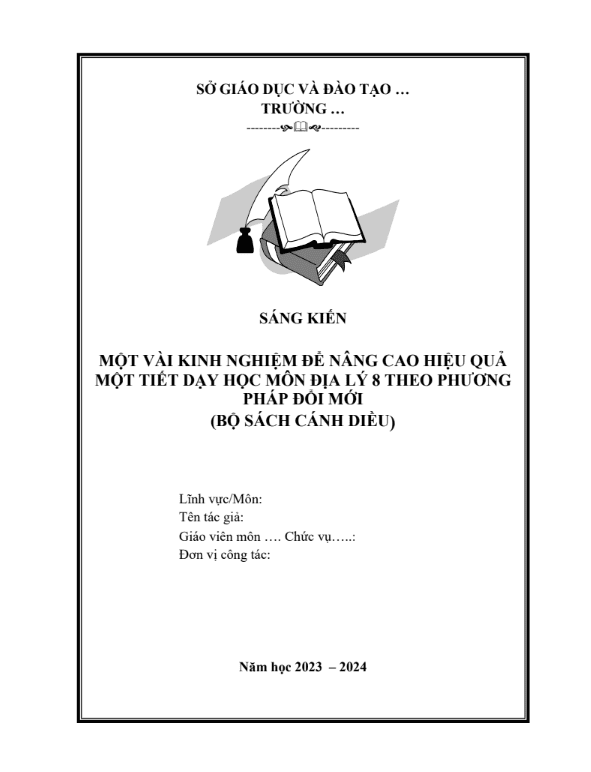SKKN Some methods help class 8D students at Nhu Ba Sy Secondary School improve their writing skills
- Mã tài liệu: BM8173 Copy
| Môn: | Tiếng anh |
| Lớp: | 8 |
| Bộ sách: | |
| Lượt xem: | 359 |
| Lượt tải: | 2 |
| Số trang: | 19 |
| Tác giả: | Bùi Thị Thanh Loan |
| Trình độ chuyên môn: | Cử nhân đại học |
| Đơn vị công tác: | Trường THCS Ái Mộ |
| Năm viết: | 2021-2022 |
| Số trang: | 19 |
| Tác giả: | Bùi Thị Thanh Loan |
| Trình độ chuyên môn: | Cử nhân đại học |
| Đơn vị công tác: | Trường THCS Ái Mộ |
| Năm viết: | 2021-2022 |
Sáng kiến kinh nghiệm “SKKN Some methods help class 8D students at Nhu Ba Sy Secondary School improve their writing skills” triển khai gồm các biện pháp nổi bật sau:
1.View the improvement of students’ writing as our responsibility.
2. Let students know that we value good writing.
3. Regularly assign brief writing exercises in our classes.
4. Provide guidance throughout the writing process.
5. Don’t feel as though we have to read and grade every piece of your students’ writing.
6.Find other faculty members who are trying to use writing more effectively in their courses.
Mô tả sản phẩm
- INTRODUCTION .
Writing skills can be the ticket to better school grades and greater academic achievement. This research introduces a few techniques for applying writing skills to school success. But this good advice will be lost on you if you do not believe writing skills are important and can help students achieve academic mastery. My job is to convince you. To begin with, the overwhelming majority of instructors we surveyed said that writing skills are critical to academic success.
And if you see yourself as one of those secondary school students who will say “Phew” when the syllabus reveals only exams and no papers, what happens when those exams turn out to be essay tests? This article suggests a few ways to raise students’ grade on those exams simply by employing the principles of good writing even if students study no harder and know the material no better than you do now.
Perhaps you’ve heard that no one cares about your grades once you leave the halls of academia. While that notion holds some truth, it is equally true that most potential employers do care about writing skills. They care so much that they bemoan the poor preparation of the entry-level pool of grads. In a labor force full of mediocre writers, someone who writes well is bound to stand out and succeed.
Academicians and business people view writing skills as crucial, yet increasing numbers of these professionals note a steady erosion in the writing abilities of graduates. The summary of a study published in Personnel Update states: “Writing skills … of executives are shockingly low, indicating that schools and colleges dismally fail with at least two-thirds of the people who pass through the education pipeline coming out unable to write a simple letter.”
In 1988, Lin Grensing reported that 79 percent of surveyed executives cited writing as one of the most neglected skills in the business world, yet one of the most important to productivity. A 1992 survey of 402 companies reported by the Associated Press noted that executives identified writing as the most valued skill but said 80 percent of their employees at all levels need to improve. The number of workers needing improvement in writing skills was up 20 percent from results of the same survey in 1991. Results of a 1993 study by Olsten Corp., a placement agency, were almost identical: 80 percent of 443 employers surveyed said their workers needed training in writing skills.
Writing skills are an important part of communication. Good writing skills allow people to communicate their message with clarity and ease to a far larger audience than through face-to-face or telephone conversations.
They might be called upon to write a report, plan or strategy at work; write a grant application or press release within a volunteering role; or they may fancy communicating their ideas online via a blog. And, of course, a well written C.V. or résumé with no spelling or grammatical mistakes is essential if they want a new job.
Today, when anyone can be their own publisher, we see more and more examples of poor writing skills both in print and on the web. Poor writing skills create poor first impressions and many readers will have an immediate negative reaction if they spot a spelling or grammatical mistake. As just one example, a spelling mistake on a commercial web page may cause potential customers to doubt the credibility of the website and the organisation.
We use language, both in its written and spoken form, in an attempt to better communicate with those around us. The better a person is able to speak, read and write this language, then the better they will be able to communicate with others who use the same language to communicate. “Good writing skills can make our material easier to understand, more respected, and actually paid attention to. If you can’t engage someone in what you are trying to say, why do you think they would listen to you?” “Good persuasive skills are also writing skills, and with this past election, we’ve seen how important it is to get people to your side of thinking.” Without good writing skills, grades could totally be affected. Term papers would not be written well. People would more than likely be bored and not to listen to a word you said. “More and more companies today are looking for Job applicants that have good writing skills. The Instructors that were surveyed said that writing skills are critical to academic success.” with good writing skills, come good communication skills. It is important for people to understand your thoughts and ideas in a clear way. I have found that reading helps your writing skills a great deal. Therefore, I have decided to choose “ Some methods help class 8D students at Nhu Ba Sy Secondary School improve their writing skills”
- THE REASONS FOR THIS RESEARCH.
Anyone – whether they are an English teacher or student – will tell themselves the four main skills they need to develop when learning a second language are speaking, listening, reading and…writing. Naturally, learning to speak the second language is often the priority. Listening is essential for speaking, and students easily practice listening skills through movies and songs. Reading is also a skill they may develop easily with the vast amount of material available on the Internet. But writing is usually the skill that is most poorly developed, nowadays only practiced in short emails, abbreviated chat messages or some simple forms.
It is very easy to work on the first three skills in the English classroom, but improving writing takes a real conscious effort both on our part and our students’. This is the reason why I choose this top pic for my research.
- THE CONTENTS.
I.Justification:
- Teaching purposes :
The purpose of foreign language teaching is not only to provide students with the knowledge of that language , but the ultimate goal of teaching foreign languages in general and English in particular is helping students gain the ability to communicate in English . The ability of students to communicate through skills : Listening, Speaking , Reading and Writing . English writing skills of students are formed through a process of academic training in English environment . In addition to learning in the classroom , students have to study with different methods .
Writing is the ability to use language knowledge for the purposes of writing in English .
- The basic factors directly impact the effectiveness of the writing lesson .
a Teacher:
– With the new teaching method , teacher plays a positive role in directing and controlling students in most classroom activities .
– To carry out an effective writing lesson, teachers should implement the following basic elements :
1.View the improvement of students’ writing as our responsibility.
Teaching writing is not only the job of the English department alone. Writing is an essential tool for learning a discipline and helping students improve their writing skills is a responsibility for all faculty.
- Let students know that we value good writing.
Stress the importance of clear, thoughtful writing. Faculty who tell students that good writing will be rewarded and poor writing will be penalized receive better essays than instructors who don’t make such demands. In the syllabus, on the first day, and throughout the term, remind students that they must make their best effort in expressing themselves on paper. Back up your statements with comments on early assignments that show you really mean it, and your students will respond.
3. Regularly assign brief writing exercises in our classes.
To vary the pace of a lecture course, ask students to write a few minutes during class. Some mixture of in-class writing, outside writing assignments,
TÀI LIỆU LIÊN QUAN
- 0
- 114
- 1
- [product_views]
- 2
- 163
- 2
- [product_views]
- 3
- 183
- 3
- [product_views]
- 0
- 124
- 4
- [product_views]
- 0
- 134
- 5
- [product_views]
- 0
- 109
- 6
- [product_views]
- 5
- 101
- 7
- [product_views]
- 7
- 117
- 8
- [product_views]
- 1
- 174
- 9
- [product_views]
- 8
- 179
- 10
- [product_views]

